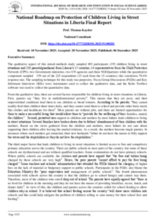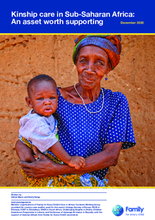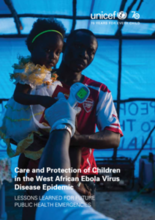Effective
NO SOURCE GIVEN
Social Welfare Spending
NO SOURCE GIVEN
Alternative Care Policy in Line with the 2009 Guidelines
Children’s Law 2012
i
In 2012, following many years of discussions, the Children’s Law was passed, which enacted into domestic law the UNCRC and the ‘Guidelines for the Alternative Care of Children’. The Children’s Law provides a clear, systematic framework to help guide activities to strengthen the overall child protection system, especially in stipulating the role and responsibilities of different actors, both government and non-government. Prior to the law’s enactment, Liberia lacked a comprehensive child protection legal framework. Source: Country Care Profile: Liberia (Better Care Network and UNICEF, 2015)
Centralised Authority on Adoption
NO SOURCE GIVEN
i
A 2007 Holt International assessment highlighted the continued lack of an adoption regulatory framework, with central government authority, to uphold each child’s best interest and regulate and monitor adoption agencies and ICA practices. Source: Country Care Profile: Liberia (Better Care Network and UNICEF, 2015)
Commitment to Deinstitutionalistion
NO SOURCE GIVEN
i
As of 2015, within the MoHSW, the DSW has shown considerable commitment to the issue of alternative care. However, in the past the issue has failed to attract the political commitment of high-level officials within the MoHSW, within other ministries, or the executive and legislative branches of government. Source: Country Care Profile: Liberia (Better Care Network and UNICEF, 2015)
Comprehensive Child Protection Law
Constitution of the Republic of Liberia (1984); Children’s Law (2012); Regulations for the Appropriate Use and Conditions of Alternative Care for Children (2010); National Social Welfare Policy and Action Plan (2012); and more
i
Liberia is an interesting case study of using the care-reform process to influence wider child protection legal reform and systems strengthening. In Liberia, the concurrent alternative care-reform process has shaped the development process of the country’s Children’s Law (2012). The findings from alternative care assessments have informed the need for stronger oversight, regulatory, coordination and capacity provisions. The analysis and profiling of children in alternative care through the deinstitutionalization programme have helped to identify gaps within the overall child protection system and so contributed to a more holistic vision of child protection. This is now reflected in the Children’s Law. Source: Country Care Profile: Liberia (Better Care Network and UNICEF, 2015)
Continuum of Alternative Care Services Available
Children’s Law, Regulations for the Appropriate Use and Conditions of Alternative Care for Children
i
The Children’s Law, as well as the Regulations for the Appropriate Use and Conditions of Alternative Care for Children, also specifies provisions to ensure that the possibility of family-based alternative care for a child is considered before envisioning placement in a residential care facility, when in the best interests of the child. ensuring the availability of a range of care options faces challenges in implementation since gatekeeping and family-based alternative care services continue to be underdeveloped. While legal provisions are in place to strengthen and expand family-based alternative care, the shift from policy to practice has been slow and, in practice, the services that are readily available are mainly institution-based. Source: Country Care Profile: Liberia (Better Care Network and UNICEF, 2015)
Data System
National Data Collection System
i
As part of care reform, the Government of Liberia has placed importance on improving its information management system, specifically in developing a national data collection system to monitor alternative care providers and to better track children in residential care. The information held established a clearer picture of the number and profile of children living in residential care. As of 2013, the database system is functional, generating reports to assist in the family tracing and reunification (FTR) process. However, the continued lack of a central data collection system for wider child protection is a source of concern and has been identified as a priority by the CRC, as well as USAID, Save the Children, UNICEF and other key partners in Liberia. Source: Country Care Profile: Liberia (Better Care Network and UNICEF, 2015)
Existence of a Regulatory Body and Regulatory System
Regulations for the Appropriate Use and Conditions of Alternative Care for Children
i
One of the first issues tackled by the government was strengthening the regulatory framework of residential care by enacting the Regulations for the Appropriate Use and Conditions of Alternative Care for Children (2010). This was a direct result of findings that emerged from alternative care assessments and media reports between 2004 and 2009. The assessments found that: children living in orphanages were living in unsuitable conditions and denied basic human rights; management were often motivated by personal self-interest, making it difficult for children to exit and to close down the home; and orphanages were often a vehicle for child trafficking. Thus, one of the first priorities for the MoHSW was to establish regulations to respond to these concerns and regulate services to be in line with the Guidelines for the Alternative Care of Children, UNCRC, and international best practice. Source: Country Care Profile: Liberia (Better Care Network and UNICEF, 2015)
Gatekeeping Mechanism/Policy
child placement committees in six counties (Bomi, Gbarpolu, Montserrado, Bong, Margibi and Nimba)
i
In order to fill the care planning and gatekeeping capacity gaps, Save the Children has supported MoHSW in creating child placement committees in six counties (Bomi, Gbarpolu, Montserrado, Bong, Margibi and Nimba) to shift the decision-making away from Monrovia to the county level. Source: Country Care Profile: Liberia (Better Care Network and UNICEF, 2015)
Means of Tracking Progress with Reforms
NO SOURCE GIVEN
Moratorium on Admission into Institutions for Children Under 3
NO SOURCE GIVEN
Moratorium on New Institutions
NO SOURCE GIVEN
National Action Plan to Guide Reforms
Deinstitutionalization of Children and Promotion of Alternative Care Project
i
Reform efforts were set out in the Deinstitutionalization of Children and Promotion of Alternative Care Project. Source: Country Care Profile: Liberia (Better Care Network and UNICEF, 2015)
National Standards of Care
NO SOURCE GIVEN
i
At the time of writing of the Liberia Country Care Profile (Better Care Network and UNICEF, 2015), there were no minimum standards for foster care.
Prevention of Separation Services Available
Regulations for the Appropriate Use and Conditions of Alternative Care for Children, Children’s Law, National Social Welfare Policy and the Essential Package of Social Services
i
In terms of upholding parental responsibility and supporting families as outlined in the Children’s Law, support services are currently limited or have inadequate coverage. As a consequence of the long-term effects of civil war, fragmentation of social welfare and referral systems, and shifting from provision of emergency to non-emergency services, Liberia is only just beginning to develop preventive and supportive services. Only a small number of support services are available, such that children are still being separated from their families unnecessarily. In response to the above-mentioned issues, the Government of Liberia has begun to shift the emphasis of the care system to place more of a focus on supporting families, as illustrated by the Regulations for the Appropriate Use and Conditions of Alternative Care for Children, Children’s Law, National Social Welfare Policy and the Essential Package of Social Services. The Children’s Law and the National Social Welfare Policy, in particular, place strong focus on strengthening the family unit. However, as discussed in the legal framework section, challenges remain in implementation of these provisions due to the lack of available services, funding and mechanisms. Source: Country Care Profile: Liberia (Better Care Network and UNICEF, 2015)
Support for Careleavers (in Legislation and in Practice)
NO SOURCE GIVEN
Policies and services available to promote and support family reintegration
Case Management and Reintegration Training for DSW staff, Association of Reunified Children
i
With support from UNICEF, Save the Children and other partners, DSW has strengthened its capacity to undertake family tracing and reintegration of children in orphanages as well as those living on the streets. DSW staff, including county social welfare supervisors, have been trained and mentored in case management and reintegration protocols. The MoHSW (De-Plan Office) is also in the process of forming an Association of Reunified Children, which will be a support network for adolescents and young adults who have grown up in out-of-home care and have requested MoHSW help with reintegration. Source: Country Care Profile: Liberia (Better Care Network and UNICEF, 2015)
Care Planning and Recordkeeping
i
2006–2007 assessments found that there was a poor level of registration and recordkeeping for children in orphanages. As a result of these findings, the government has improved care planning and monitoring of children once they enter residential care. Each child has a profile and the DSW knows which child is entering and exiting an orphanage. Source: Country Care Profile: Liberia (Better Care Network and UNICEF, 2015)
Moratorium on Intercountry Adoption
Suspension of all Intercountry Adoptions in 2009, draft Adoption Bill
i
Advocacy efforts ultimately led to the Government of Liberia recognising calling for a suspension of all ICA from Liberia on 26 January 2009. As of 2015, this moratorium was still in effect and ICA was only legally available for children with severe medical conditions. With support from UNICEF, embassies, and civil society partners, the Government of Liberia also developed a draft Adoption Bill taking in recommendations of the assessments. Source: Country Care Profile: Liberia (Better Care Network and UNICEF, 2015)
Emergency care policies and interventions
i
As of 2015, there was no national, government-led child protection emergency preparedness and response plan. A discussion process is underway with the Child Protection Working Group to develop a national emergency child protection response plan, which would include preventing family separation, interim care arrangements, and tracing and family reintegration. Source: Country Care Profile: Liberia (Better Care Network and UNICEF, 2015)
Awareness-Raising
i
The Ministry of Health and Social Welfare, in partnership with UNICEF and Save the Children, has conducted capacity-building activities with government staff, orphanage directors, community members, parents and children to increase their awareness and knowledge on alternative care-related issues. The Department of Social Welfare, under the leadership of Deputy Assistant Ministers and the National Director of De-Plan, has conducted a series of ongoing regional awareness-raising campaigns on family preservation, child protection and community-based care in Margibi, Bong, Nimba and Montserrado counties (in both rural and urban areas). In addition, more than 180 Community Child Welfare Committees are supporting awareness-raising campaigns and meetings on the prevention of family separation and importance of children growing up in a family setting. Despite these efforts and concrete shifts in public perception, there is a continued widespread misconception among parents and caregivers about the realities of institutional care and ICA. Source: Country Care Profile: Liberia (Better Care Network and UNICEF, 2015)



